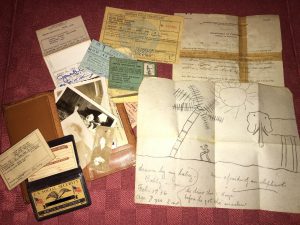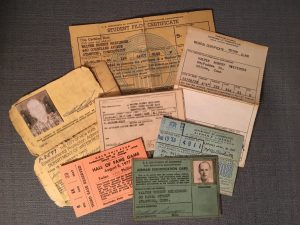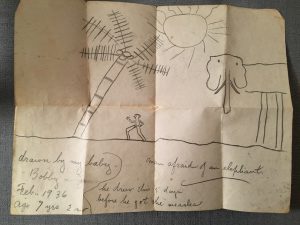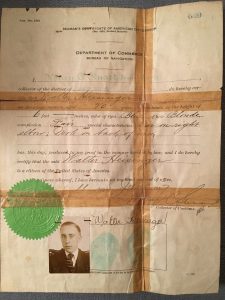 My grandfather (Walter Robert "Bob" Heisinger, a.k.a. Poppa) was notorious for carrying around a gigantic wallet bursting at the seams with photographs, business cards, and other little mementos he picked up over the years. He would often pull bits and pieces out at social gatherings as props to his stories and jokes. I remember harassing him as a teenager that the thickness of the wallet was contributing to his hip problems and I made a box for him to store some of its contents, though I am sure the box remained empty for the rest of his life.
My grandfather (Walter Robert "Bob" Heisinger, a.k.a. Poppa) was notorious for carrying around a gigantic wallet bursting at the seams with photographs, business cards, and other little mementos he picked up over the years. He would often pull bits and pieces out at social gatherings as props to his stories and jokes. I remember harassing him as a teenager that the thickness of the wallet was contributing to his hip problems and I made a box for him to store some of its contents, though I am sure the box remained empty for the rest of his life.
 Recently, my grandmother gave Poppa’s billfold to my father. This was not the infamous bursting wallet, but another that he also took with him everywhere. I was excited to go through its contents to be reminded of the treasures I had seen him pull out a million times before and discover what he kept inside that he did not share with the world. For starters, he carried with him several of his airman’s licenses. He apparently never discarded of any of them and just kept collecting them each time he received a new one. Amongst these was also a ticket to the Baseball Hall of Fame from 1977, a trip my father remembers taking with him. It was obviously a memory my Poppa treasured as well.
Recently, my grandmother gave Poppa’s billfold to my father. This was not the infamous bursting wallet, but another that he also took with him everywhere. I was excited to go through its contents to be reminded of the treasures I had seen him pull out a million times before and discover what he kept inside that he did not share with the world. For starters, he carried with him several of his airman’s licenses. He apparently never discarded of any of them and just kept collecting them each time he received a new one. Amongst these was also a ticket to the Baseball Hall of Fame from 1977, a trip my father remembers taking with him. It was obviously a memory my Poppa treasured as well.
He also had several photographs from his childhood – many of family members, but also of himself. One that I had seen many times was my Poppa as a child wrapped in bandages from head to toe after getting poison ivy. The mummified look seemed a bit dramatic as a response to poison ivy, but it fits the personality of the person that kept the photograph to display to others decades afterward. The joke continues today, as I can’t help but laugh every time I see it.
 I got another good laugh at a drawing I had never seen before. Delightfully titled “Man afraid of an elephant,” it depicts a man running away from an elephant with a note from my great-grandmother that it was drawn by Poppa in February 1936, when he was nine years and two months old. She also noted that he drew this five days before he got the measles. I guess we’ll never know why Poppa kept this drawing for his entire lifetime, but my guess is that there is a joke in there somewhere.
I got another good laugh at a drawing I had never seen before. Delightfully titled “Man afraid of an elephant,” it depicts a man running away from an elephant with a note from my great-grandmother that it was drawn by Poppa in February 1936, when he was nine years and two months old. She also noted that he drew this five days before he got the measles. I guess we’ll never know why Poppa kept this drawing for his entire lifetime, but my guess is that there is a joke in there somewhere.
 To my surprise, not all the contents pertained to my grandfather. Once such piece was the Seaman’s Certificate of American Citizenship issued to my great-grandfather, Walter Heisinger, in 1917, when he was only 20 years old. The document, taped at the creases where it had been folded for years, included Walter’s picture and his fingerprints as well as his physical description. I had no idea that this document existed, let alone that Poppa carried it with him daily. This must have been something of his father’s that was particularly special to him.
To my surprise, not all the contents pertained to my grandfather. Once such piece was the Seaman’s Certificate of American Citizenship issued to my great-grandfather, Walter Heisinger, in 1917, when he was only 20 years old. The document, taped at the creases where it had been folded for years, included Walter’s picture and his fingerprints as well as his physical description. I had no idea that this document existed, let alone that Poppa carried it with him daily. This must have been something of his father’s that was particularly special to him.
All the items in his billfold were from years past, and none of them necessary to carry with him in the latter years of his life except as a reminder that those memories and people most dear to him were close to his heart. (He kept the billfold in his jacket pocket.) They also served as conversation pieces and a way to relive the past. I once thought it absurd to carry a lifetime of items every day. Now I know that the items he carried were badges of honor for him and told the story of his life, silly and ridiculous as they may seem, and that they were uniquely Poppa.
Share this:

About Meaghan E.H. Siekman
Meaghan joined the American Ancestors staff in 2013 as a Researcher before moving to the Publications team in 2018 where she is currently a Senior Genealogist of the Newbury Street Press. As a part of the Publications team, Meaghan researches and writes family histories and other scholarly projects. She also regularly develops and presents lectures as well as other educational material on a variety of research topics. Additionally, Meaghan serves as the American Ancestor's representative to the New England Regional Fellowship Consortium. Meaghan holds a PhD in history from Arizona State University where her focus was public history and American Indigenous history. Prior to joining American Ancestors, she worked as Curator of the Fairbanks House in Dedham, Massachusetts and as an archivist at the Heard Museum Library in Phoenix. Meaghan also worked for the National Park Service and wrote several Cultural Landscape Inventories, most notably for Victoria Mine within the Organ Pipe Cactus National Monument. Her doctoral dissertation, Weaving a New Shared Authority: The Akwesasne Museum and Community Collaboration Preserving Cultural Heritage, 1970-2012, explored how tribal museum utilized shared authority with their communities. For American Ancestors, Meaghan authored Ancestry of Secretary Lonnie G. Bunch II in 2023, and Ancestry of Douglas Brinkley in 2019. She co-authored with Chistopher C. Child, Family Tales and Trials: Settling the American South in 2020. She also contributed to Ancestors of Cokie Boggs Roberts with Kyle Hurst in 2016. She has published portable genealogists on African American Genealogy (2015) and Native Nations in New England (2020). Meaghan has authored several articles in her tenure for American Ancestors magazine including most recently, “10 Myths about Slavery in the United States.” She has presented many lectures on African American genealogy, researching enslaved ancestors, researching the history of a house, using oral history in genealogical research, researching women, and other topics.View all posts by Meaghan E.H. Siekman →